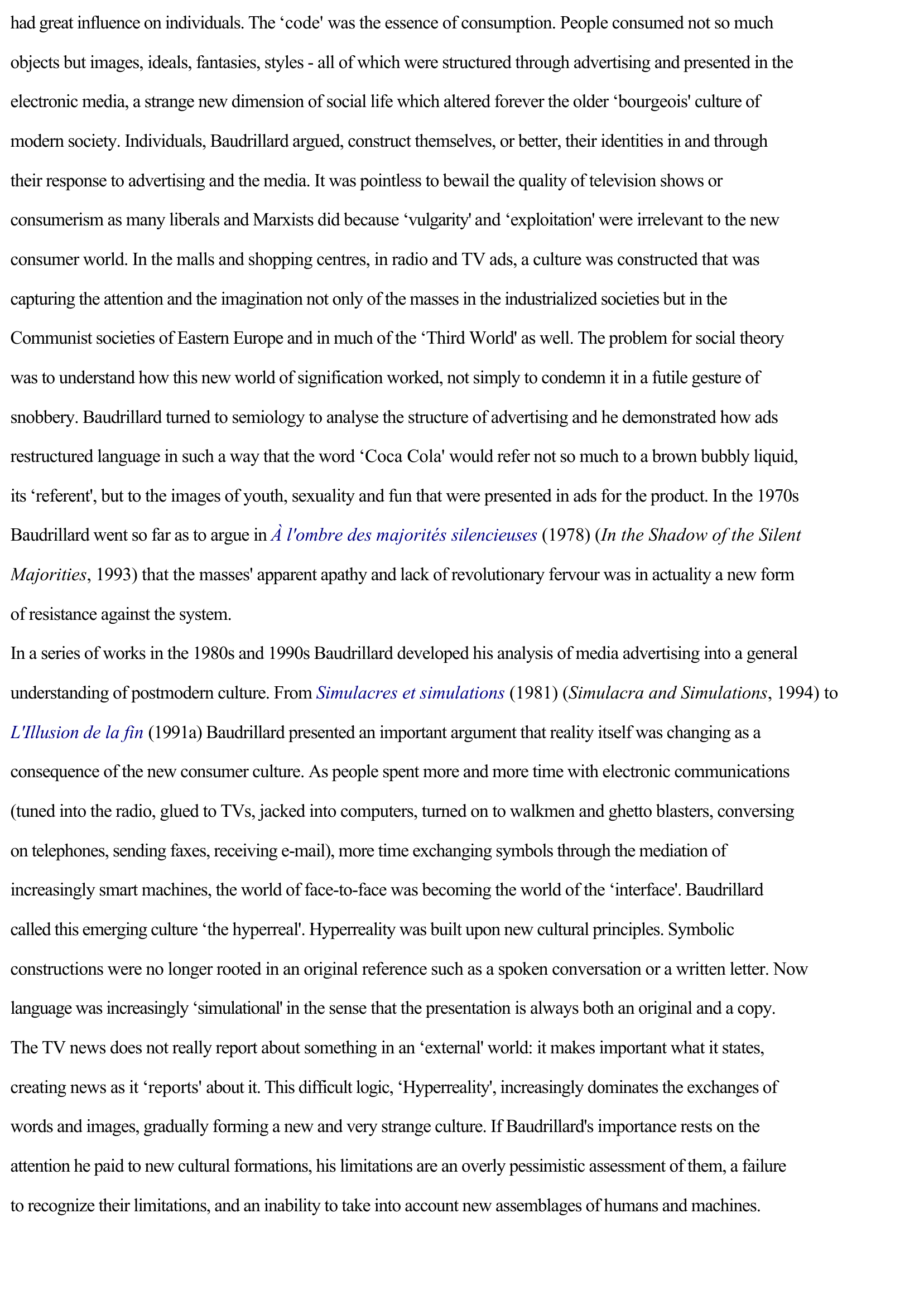Baudrillard, Jean
Publié le 22/02/2012

Extrait du document
«
had great influence on individuals.
The ‘code' was the essence of consumption.
People consumed not so much
objects but images, ideals, fantasies, styles - all of which were structured through advertising and presented in the
electronic media, a strange new dimension of social life which altered forever the older ‘bourgeois' culture of
modern society.
Individuals, Baudrillard argued, construct themselves, or better, their identities in and through
their response to advertising and the media.
It was pointless to bewail the quality of television shows or
consumerism as many liberals and Marxists did because ‘vulgarity' and ‘exploitation' were irrelevant to the new
consumer world.
In the malls and shopping centres, in radio and TV ads, a culture was constructed that was
capturing the attention and the imagination not only of the masses in the industrialized societies but in the
Communist societies of Eastern Europe and in much of the ‘Third World' as well.
The problem for social theory
was to understand how this new world of signification worked, not simply to condemn it in a futile gesture of
snobbery.
Baudrillard turned to semiology to analyse the structure of advertising and he demonstrated how ads
restructured language in such a way that the word ‘Coca Cola' would refer not so much to a brown bubbly liquid,
its ‘referent' , but to the images of youth, sexuality and fun that were presented in ads for the product.
In the 1970s
Baudrillard went so far as to argue in À l'ombre des majorités silencieuses (1978) ( In the Shadow of the Silent
Majorities , 1993) that the masses' apparent apathy and lack of revolutionary fervour was in actuality a new form
of resistance against the system.
In a series of works in the 1980s and 1990s Baudrillard developed his analysis of media advertising into a general
understanding of postmodern culture.
From Simulacres et simulations (1981) ( Simulacra and Simulations , 1994) to
L'Illusion de la fin (1991a) Baudrillard presented an important argument that reality itself was changing as a
consequence of the new consumer culture.
As people spent more and more time with electronic communications
(tuned into the radio, glued to TVs, jacked into computers, turned on to walkmen and ghetto blasters, conversing
on telephones, sending faxes, receiving e-mail), more time exchanging symbols through the mediation of
increasingly smart machines, the world of face-to-face was becoming the world of the ‘interface' .
Baudrillard
called this emerging culture ‘the hyperreal' .
Hyperreality was built upon new cultural principles.
Symbolic
constructions were no longer rooted in an original reference such as a spoken conversation or a written letter.
Now
language was increasingly ‘simulational' in the sense that the presentation is always both an original and a copy.
The TV news does not really report about something in an ‘external' world: it makes important what it states,
creating news as it ‘reports' about it.
This difficult logic, ‘Hyperreality' , increasingly dominates the exchanges of
words and images, gradually forming a new and very strange culture.
If Baudrillard's importance rests on the
attention he paid to new cultural formations, his limitations are an overly pessimistic assessment of them, a failure
to recognize their limitations, and an inability to take into account new assemblages of humans and machines..
»
↓↓↓ APERÇU DU DOCUMENT ↓↓↓
Liens utiles
- SYSTÈME DES OBJETS (LE), 1968. Jean Baudrillard (résumé & analyse)
- ÉCHANGE SYMBOLIQUE ET LA MORT (L’), Jean Baudrillard
- Baudrillard, Jean - sociologie.
- Qui était Jean BAUDRILLARD ?
- POUR UNE CRITIQUE DE L’ÉCONOMIE POLITIQUE DU SIGNE, Jean Baudrillard

































